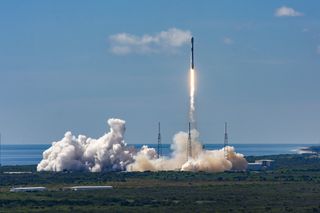SpaceX scrubs Starlink satellite launch on record 7th flight of a Falcon 9 rocket
It's poised to be the 100th Falcon 9 launch for SpaceX.

SpaceX called off the launch of its next Starlink satellite fleet late Sunday (Nov. 22), delaying a potentially record-setting flight for the mission's Falcon 9 rocket.
A Falcon 9 rocket was poised to make its seventh launch (a record for the reusable booster) from Cape Canaveral Air Force Station in Florida when SpaceX scrubbed the mission. The liftoff was scheduled for 9:56 p.m. EST (0256 GMT) to deliver 60 Starlink internet satellites to orbit.
"Standing down from today's launch of Starlink," SpaceX said in an update on Twitter. "Rocket and payload are healthy; teams will use additional time to complete data reviews and are now working toward backup opportunity on Monday, November 23 at 9:34 p.m. but keeping an eye on recovery weather."
Related: See the evolution of SpaceX's rockets in pictures
SpaceX was just over 30 minutes from launch when the mission was scrubbed.
"Hold, hold, hold," SpaceX's launch director said in a live audio webcast from Mission Control. " We're standing down from today's attempt for additional mission assurance."
Sunday's launch attempt followed on the heels of a successful Falcon 9 launch from Vandenberg Air Force Base in California on Saturday. That mission launched the Sentinel-6 Michael Freilich ocean-mapping satellite for NASA and the European Space Agency, and landed its first stage booster shortly afterward.
Get the Space.com Newsletter
Breaking space news, the latest updates on rocket launches, skywatching events and more!
Today's planned launch would have marked SpaceX's 23rd launch of 2020 and the landmark 100th flight of a Falcon 9 rocket. It is also SpaceX's 16th Starlink mission to build up a massive constellation of high-speed internet satellites in orbit.
The Falcon 9 first stage for this flight first launched in September 2018, when it carried the Telstar 18 Vantage communications satellite into orbit. It flew again in January 2019 to deliver 10 Iridium Next satellites to orbit, and then four more times this year on different Starlink missions.
After today's planned launch, the booster was expected to return to Earth again to land itself on SpaceX's drone ship "Of Course I Still Love You" in the Atlantic Ocean. The weather conditions for that planned recovery could impact plans for another launch attempt on Monday.
SpaceX's current Falcon 9 rockets, called the Block 5 series, are designed to fly at least 10 times, if not more, the company has said.
Email Tariq Malik at tmalik@space.com or follow him on Twitter @tariqjmalik. Follow us on @Spacedotcom and Facebook and Instagram.
Join our Space Forums to keep talking space on the latest missions, night sky and more! And if you have a news tip, correction or comment, let us know at: community@space.com.

Tariq is the Editor-in-Chief of Space.com and joined the team in 2001, first as an intern and staff writer, and later as an editor. He covers human spaceflight, exploration and space science, as well as skywatching and entertainment. He became Space.com's Managing Editor in 2009 and Editor-in-Chief in 2019. Before joining Space.com, Tariq was a staff reporter for The Los Angeles Times covering education and city beats in La Habra, Fullerton and Huntington Beach. In October 2022, Tariq received the Harry Kolcum Award for excellence in space reporting from the National Space Club Florida Committee. He is also an Eagle Scout (yes, he has the Space Exploration merit badge) and went to Space Camp four times as a kid and a fifth time as an adult. He has journalism degrees from the University of Southern California and New York University. You can find Tariq at Space.com and as the co-host to the This Week In Space podcast with space historian Rod Pyle on the TWiT network. To see his latest project, you can follow Tariq on Twitter @tariqjmalik.
